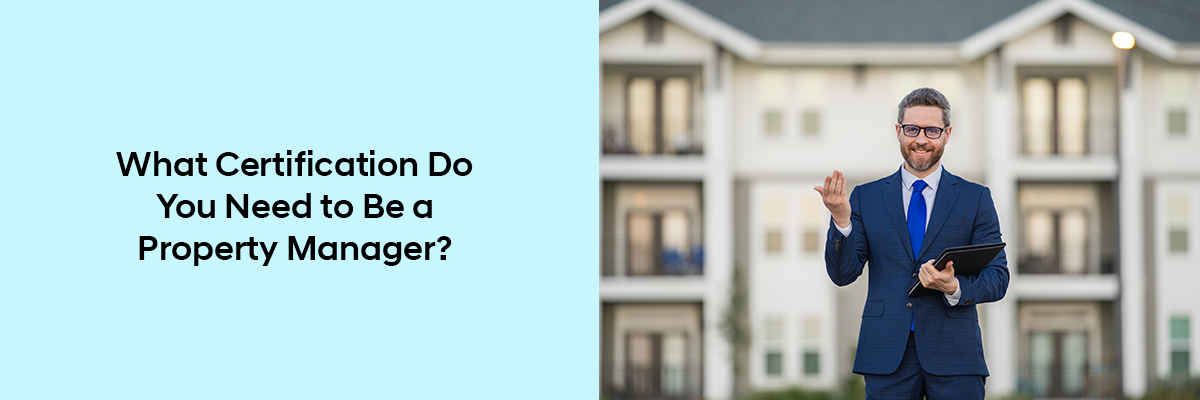Managing properties isn’t just about collecting rent or fixing leaky faucets. It’s a career that requires knowledge of laws, finance, tenant relations, maintenance, and real estate markets.
As the real estate industry becomes increasingly regulated, more states and employers are requiring property managers to hold certifications or licenses.
If you’re thinking about entering this field, you might be wondering: What certification do you need to be a property manager?
Let’s break it down.



1. Do You Really Need a Certification to Be a Property Manager?
The short answer: It depends on where you live and what kind of properties you manage.
Some states require property managers to be licensed real estate agents, while others only require certification or registration. In a few states, no formal certification is mandated at all.
But even if certification is not legally required, earning a professional credential can significantly boost your credibility, skills, and income potential.
2. Licensing Requirements by State
Here’s a brief overview of how licensing varies:
- States like Florida, California, and Texas require property managers to have a real estate broker’s license or work under a licensed broker.
- In Oregon and South Carolina, a property manager license is required that is distinct from a real estate license.
- Some states like Idaho and Massachusetts do not require any formal licensing.
Always check your state real estate commission or department of professional regulation for the latest requirements.
3. National Certifications for Property Managers
Even if your state doesn’t require certification, national credentials can help you stand out. Here are the most recognized certifications in the property management industry:
1. Certified Property Manager (CPM) – IREM
- Offered by: Institute of Real Estate Management (IREM)
- Best for: Mid-level and senior property managers managing portfolios or larger buildings
- Requirements:
- Several years of property management experience
- Completion of coursework in ethics, finance, operations, and marketing
- Passing the CPM certification exam
- Why It Matters: The CPM is one of the most prestigious credentials in the field.
2. Residential Management Professional (RMP) – NARPM
- Offered by: National Association of Residential Property Managers (NARPM)
- Best for: Managers of single-family homes and small residential properties
- Requirements:
- At least 2 years of experience
- Management of a minimum number of residential units
- Education courses and code of ethics compliance
- Why It Matters: It’s ideal for residential specialists and builds toward the MPM.
3. Master Property Manager (MPM) – NARPM
- Offered by: NARPM
- Best for: Experienced property managers ready to take leadership roles
- Requirements:
- Must hold RMP first
- Additional experience and education
- Documented portfolio of managed properties
- Why It Matters: MPM is a sign of extensive experience and skill in residential property management.
4. Certified Apartment Manager (CAM) – NAA
- Offered by: National Apartment Association (NAA)
- Best for: Managers of apartment communities
- Requirements:
- 12 months of onsite property management experience
- Completion of coursework and passing exam
- Why It Matters: Tailored for the multifamily sector, CAM is highly respected in the rental housing industry.
5. Accredited Residential Manager (ARM) – IREM
- Offered by: IREM
- Best for: Entry-level to mid-career residential property managers
- Requirements:
- Residential management experience
- Coursework and ethics training
- Why It Matters: It’s a stepping stone to the more advanced CPM.
4. Specialized Certifications You Might Consider
In addition to general property management certifications, there are niche credentials to enhance specific skills:
- Certified Manager of Community Associations (CMCA) – For managing homeowners’ associations or condos.
- LEED AP or Green Property Management Certification – For sustainability-focused professionals.
- Fair Housing Certification – Required in many states or by employers to ensure compliance with anti-discrimination laws.
5. Benefits of Getting Certified
- Increased Earning Potential: Certified managers often earn higher salaries and bonuses.
- Better Job Opportunities: Many employers require or prefer certified candidates.
- Legal Compliance: Training ensures you understand landlord-tenant laws, fair housing, and safety codes.
- Professional Credibility: Certification shows you take your career seriously and adhere to a code of ethics.
6. How to Choose the Right Certification
Consider these questions:
- What kind of properties do you manage (residential, commercial, HOA)?
- Are you looking for an entry-level credential or an advanced one?
- Is there a specific certification recognized or preferred in your region?
- Do you want to work independently or for a large firm?
If you’re just starting, something like the ARM or CAM might be ideal. For experienced managers, CPM or MPM could elevate your career to the next level.
7. Cost and Time Commitment
- Certifications can range from a few hundred to several thousand dollars.
- Most programs require several weeks to months to complete, especially if experience prerequisites are involved.
- Many organizations offer online courses, making it easier to balance work and education.
To know more about How far back does Section 8 background check go, do check out our in-depth blog.
Final Thoughts
In today’s competitive real estate environment, getting certified is more than just a résumé booster, it’s an investment in your future. Whether you’re aiming to manage luxury apartments, commercial buildings, or HOAs, there’s a certification tailored to your goals.
Staying informed and professionally trained ensures not just legal compliance, but also long-term success. Explore property management training online on topics like Fair Housing, Lease Audits, HUD compliance, and more to stay ahead in property management compliance and regulation.


